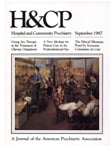Inpatient Treatment of Complicated Agoraphobia and Panic Disorder
Abstract
Despite recent advances in the treatment of agoraphobia and panic disorder, some patients do not respond to standard outpatient regimens of biological and psychosocial intervention and may require more intensive, closely supervised care. The authors describe a specialized inpatient program that integrates pharmacotherapy, intensive levels of exposure and other behavioral therapies, a structured and strategically reinforcing environment, panic and anxiety management strategies, and other interventions designed specifically for patients with complicated panic-based disorders. Outcome data for 25 patients indicate that after a mean stay of 35 days, 19 patients were significantly improved. These preliminary results suggest that appropriately designed inpatient programs offer an effective treatment option for some patients with refractory conditions of agoraphobia or panic disorder.
Access content
To read the fulltext, please use one of the options below to sign in or purchase access.- Personal login
- Institutional Login
- Sign in via OpenAthens
- Register for access
-
Please login/register if you wish to pair your device and check access availability.
Not a subscriber?
PsychiatryOnline subscription options offer access to the DSM-5 library, books, journals, CME, and patient resources. This all-in-one virtual library provides psychiatrists and mental health professionals with key resources for diagnosis, treatment, research, and professional development.
Need more help? PsychiatryOnline Customer Service may be reached by emailing [email protected] or by calling 800-368-5777 (in the U.S.) or 703-907-7322 (outside the U.S.).



